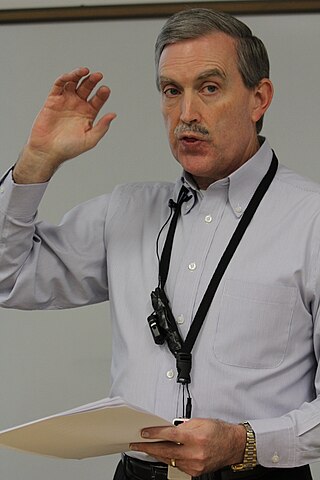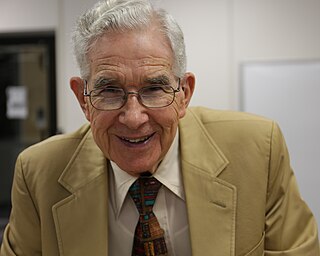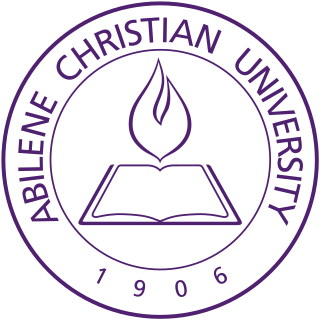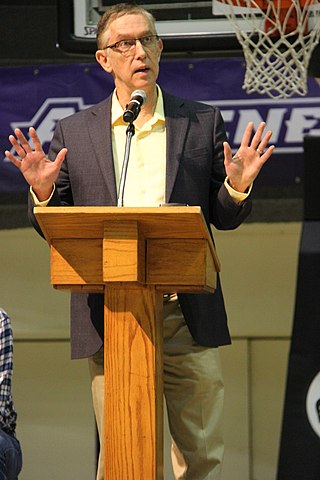
The Christian Church (Disciples of Christ) is a mainline Protestant Christian denomination in the United States and Canada. The denomination started with the Restoration Movement during the Second Great Awakening, first existing during the 19th century as a loose association of churches working towards Christian unity, then slowly forming quasi-denominational structures through missionary societies, regional associations, and an international convention. In 1968, the Disciples of Christ officially adopted a denominational structure at which time a group of churches left to remain nondenominational.

Belle Plaine is a city in Sumner County, Kansas, United States. As of the 2020 census, the population of the city was 1,467.

The Restoration Movement is a Christian movement that began on the United States frontier during the Second Great Awakening (1790–1840) of the early 19th century. The pioneers of this movement were seeking to reform the church from within and sought "the unification of all Christians in a single body patterned after the church of the New Testament."
The Churches of Christ, also commonly known as the Church of Christ, is a loose association of autonomous Christian congregations. The Churches of Christ are represented across the world. Typically, their distinguishing beliefs are that of the necessity of baptism for salvation and the prohibition of musical instruments in worship. Many Churches identify themselves as being nondenominational. The Churches of Christ arose in the United States from the Restoration Movement of 19th-century Christians who declared independence from denominations and traditional creeds. They sought "the unification of all Christians in a single body patterned after the original church of the New Testament."
Campbellite is a mildly pejorative term referring to adherents of certain religious groups that have historic roots in the Restoration Movement, among whose most prominent 19th-century leaders were Thomas and Alexander Campbell. Members of these groups generally consider the term Campbellite inappropriate, saying that they are followers of Jesus, not Campbell. They draw parallels with Martin Luther's protest of the name Lutherans and the Anabaptists' protest of the name given to them by their enemies. With specific reference to the early Restoration Movement, "[t]he terms Campbellism and Campbellites were universally rejected by those to whom they were applied."

Tolbert Fanning was one of the most influential leaders of what came to be called the American Restoration Movement. Born in what would later become Cannon County, Tennessee. He was man of many talents in both religion and agriculture: preacher, college founder and professor, journalist, writer, and editor. For his era he was considered an innovative farmer writing and co-editing magazines, Agriculturalist from 1840-1845 and the Naturalist from 1846-1850. His greatest influence was as much from his successful publications The Christian Review and Gospel Advocate, as much as from his circuit preaching. The most influential publication he founded, Gospel Advocate, inspired a former Franklin college student, David Lipscomb, who would follow Fanning as its editor. Fanning’s magazine provided a platform for purveying views and opinions relating to doctrine and church practice. It was through this influence that led to the 1906 identification of the Church of Christ as a distinct religious body, 33 years after Fanning's death.
Homer Hailey was an American preacher in the churches of Christ in the 20th century, a professor at Abilene Christian University and Florida College, and the author of at least fifteen theological books. He was well known for his general biblical knowledge, especially the Old Testament.
Robert Henry Boll was a German-born American preacher in the Churches of Christ. Boll is most known for advancing a premillennialist eschatology within the Churches of Christ, in articles written during his editorship of the front page of the Gospel Advocate from 1909 to 1915 and after 1915 in Word and Work, leading to a dispute which was a significant source of division within the Churches of Christ in the 1930s. Boll was one of the most influential advocates for the premillennial point of view, and was most singularly opposed by Foy E. Wallace Jr. By the end of the 20th century, however, the divisions caused by the debate over premillennialism were diminishing, and in the 2000 edition of the directory Churches of Christ in the United States, published by Mac Lynn, congregations holding premillennial views were no longer listed separately.

Batsell Baxter was one of the most important leaders and educators in the Churches of Christ in the first half of the 20th century.
Grover Cleveland Brewer (1884–1956) was a leader in the Churches of Christ in the US. He was said to be "among the giants of the brotherhood".

Douglas A. Foster is an American author and scholar known for his work on the history of Stone-Campbell Restoration Movement.
Dr. Rubel Shelly is an author, minister, and professor at Lipscomb University. He is the former president of Rochester University.
James Burton Coffman was "one of the most influential figures among Churches of Christ in the 20th century." He was known throughout the Churches of Christ for his exhaustive writing and study of Old Testament and New Testament scriptures. Throughout his life he served as a preacher, teacher, author, and community leader. Most of his career defined him as a teacher and administrator in school systems, congregational contexts, and as a military chaplain.

Everett Ferguson currently serves as Distinguished Scholar in Residence at Abilene Christian University in Abilene, Texas. He is author of numerous books on early Christian studies and served as co-editor of the Journal of Early Christian Studies.

Abilene Christian University (ACU) is a private Christian university in Abilene, Texas. It was founded in 1906 as Childers Classical Institute. It is affiliated with Churches of Christ.
The 1956 NCAA Track and Field Championships were held in Berkeley, California in June 1956. UCLA won the team title, ending a seven-year streak by the University of Southern California. Nine NCAA meet records and one American record were broken at the event.

Robert Dean Hunter was an American politician and academic administrator. He served as vice president at Church of Christ-affiliated Abilene Christian University in Abilene, Texas, and as a Republican member of the Texas House of Representatives, in which from 1986 to 2007 he represented District 71.

Philip J. Schubert is the eleventh and current president of Abilene Christian University, Abilene, Texas. Schubert's appointment was publicly announced on February 12, 2010, and he formally took office June 1, 2010, succeeding Royce Money. Schubert's inauguration celebration took place in the Fall of 2010.

C. Leonard Allen is the Dean of Bible at Lipscomb University.
Matt Norvel Young, known as M. Norvel Young, was an American academic administrator. He served as the president of Pepperdine University from 1957 to 1971 and as its chancellor from 1971 to 1985. He was the author of five books.










